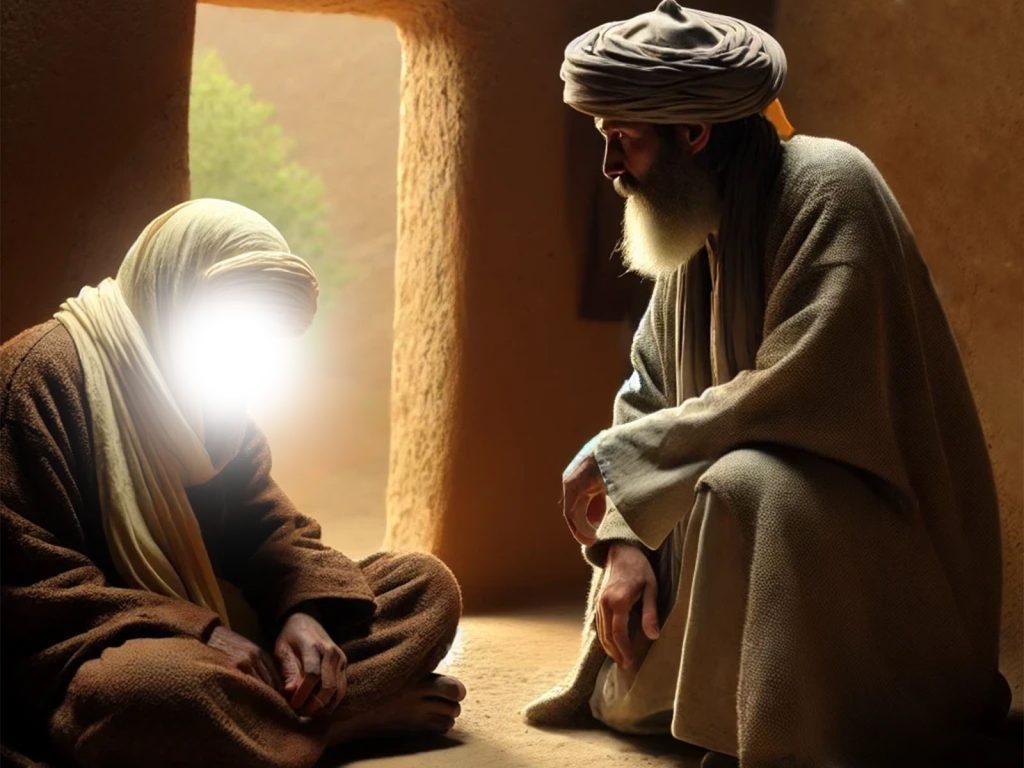“I was perplexed and bewildered; my patience was over; it was as if my soul was exiting my body; I left immediately, and did not realize how I got to Daar al-Hukumah (governor’s seat). Can I see him one more time? He is my sole existence. If, God forbid, something happens….I cannot even think about it…”
A huge crowd had gathered outside Dar al-Hukumah asking for punishment of “Ibn Muljam”. The door opened and Imam Hassan (PBUH) came out. Everyone kept quiet. He said,” O people! My father has ordered you to return to your homes [1], and asked me to leave his killer until my father passes away; if he passes away, the sentence of his killer is clear, and if he remains alive, he will decide about the man. So go back; May Allah (SWT) have mercy on you”.
The people went back, but Asbagh ibn Nubatah, who was a companion of Amir al-Mu’minin (PBUH), could not leave. The voice of crying and lamentation raised from the house, so Asbagh started crying as well. Imam Hassan (PBUH) got out again and said,” O Asbagh! Did you not hear my words which were my father’s order?”
Asbagh says, ”I said to him, ‘I did. But now that I see my master in this condition, I want to visit him once more and hear a narration from him”. Imam Hassan (PBUH) went inside, and soon after, he came out and said,” Come in”. So I entered to my master, Amir al-Mu’minin (PBUH).
The Imam (PBUH) had covered his head with a yellow cloth, but his face was more yellow than the cloth. He was bending his legs and extending them continuously due to the pain of the strike on his head and the effect the poison that had spread all over his body. I threw myself over him, kissed him, and started crying. He said to me, ”O Asbagh! Don’t cry. I swear to Allah (SWT) that I will go to Paradise.” I said, ”May I be sacrificed for you! I swear to Allah (SWT) that I know you will go to Paradise. My crying is because I will be departed from you”.
Then I said to him,” O Amir al-Mu’minin! May I be sacrificed for you! Could you narrate one of the Hadiths you have heard from the Messenger of Allah (PBUH&HP)” [2]? He replied, ”Sit; I do not think you will hear a Hadith from me anymore”.
Then he continued by saying,” Know, O Asbagh, that I went to visit the Messenger of Allah (PBUH&HP) as you have come to visit me. The Messenger of Allah (PBUH&HP) said to me,” O Abal Hassan! Call upon the people; go on top of my platform and stand one step lower than where I used to stand, and tell the people, ‘Beware! Whoever hurts his parents is away from the mercy of Allah (SWT). Beware! Whoever escapes from his parents is away from the mercy of Allah (SWT). Beware! Whoever fails to pay someone who has worked for him is away from the mercy of Allah (SWT).’
O Asbagh! I did exactly as my love had told me. So someone at the end of the mosque got up and said, ‘O Abal Hassan! You said three sentences, but they were brief. So explain them for us’. I did not respond to him until I went to the Messenger of Allah (PBUH&HP) and repeated what the man had said to him”.
At this point, Amir al-Mu’minin (PBUH) took my hand and said, ”O Asbagh! Open your hands!” I opened my hands. Then he took one of my fingers and said, “O Asbagh! the Messenger of Allah (PBUH&HP) took one of my fingers exactly as I am holding yours, and said, ‘O Abal Hassan! You and I are the two fathers of this nation. May he who hurts us be away from the mercy of Allah (SWT)! You and I are the two guardians of this nation. May he who escapes from us be away from the mercy of Allah (SWT)! You and I are the two persons responsible for serving this nation. Whoever does not pay our reward is away from the mercy of Allah (SWT).”
These were the last statements Asbagh heard from the lips of Amir al-Mu’minin (PBUH). After that, he did not hear anything from his kind father until the seed of orphanhood was spread among the nation of Islam, and the father of the nation after the Messenger of Allah (PBUH&HP) joined him in the Hereafter…
Indeed our kind father went to his Lord as such…
(The above is a selection taken from “Ihqaaq akl-Haq wa Izhaaq al-Baatil” by Ghadi Nurollah Shoushtari (with some changes and additions))[3]
Footnotes:
[1] Amaali of Shaykh Mufid, p. 351.
[2] Amaali of Shaykh Mufid, p. 352.
[3] This Hadith has been narrated with similar wordings in Amaali of Shaykh Mufid (pp. 351-353), which was used in the above mentioned passage


